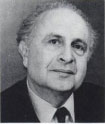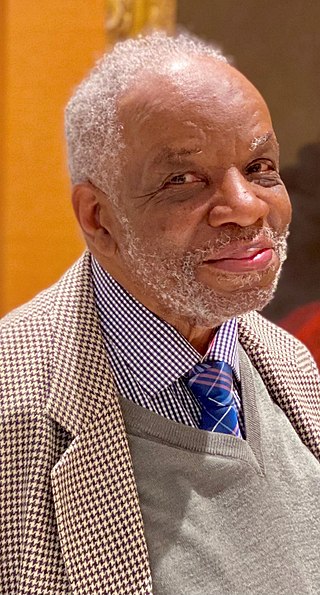Related Research Articles
Richard Bentall is a Professor of Clinical Psychology at the University of Sheffield in the UK.
Timothy John Crow is a British psychiatrist and researcher from Oxford. Much of his research is related to the causes of schizophrenia. He also has an interest in neurology and the evolutionary theory. He is the Honorary Director of the Prince of Wales International Centre for Research into Schizophrenia and Depression. He qualified at the Royal London Hospital in 1964 and obtained a PhD at the University of Aberdeen, Scotland, in 1970. He is a fellow of the Royal Colleges of Physicians and Psychiatrists and the Academy of Medical Sciences. Crow was for twenty years Head of the Division of Psychiatry of the Medical Research Council (MRC) Clinical Research Centre at Northwick Park Hospital and then a member of the External Scientific staff of the MRC in Oxford.
Biological psychiatry or biopsychiatry is an approach to psychiatry that aims to understand mental disorder in terms of the biological function of the nervous system. It is interdisciplinary in its approach and draws on sciences such as neuroscience, psychopharmacology, biochemistry, genetics, epigenetics and physiology to investigate the biological bases of behavior and psychopathology. Biopsychiatry is the branch of medicine which deals with the study of the biological function of the nervous system in mental disorders.

The Institute of Psychiatry, Psychology and Neuroscience (IoPPN) is a research institution dedicated to discovering what causes mental illness and diseases of the brain. In addition, its aim is to help identify new treatments for them and ways to prevent them in the first place. The IoPPN is a faculty of King's College London, England, previously known as the Institute of Psychiatry (IoP).
Psychological anthropology is an interdisciplinary subfield of anthropology that studies the interaction of cultural and mental processes. This subfield tends to focus on ways in which humans' development and enculturation within a particular cultural group—with its own history, language, practices, and conceptual categories—shape processes of human cognition, emotion, perception, motivation, and mental health. It also examines how the understanding of cognition, emotion, motivation, and similar psychological processes inform or constrain our models of cultural and social processes. Each school within psychological anthropology has its own approach.
Eliot Trevor Oakeshott Slater MD was a British psychiatrist who was a pioneer in the field of the genetics of mental disorders. He held senior posts at the National Hospital for Nervous Diseases, Queen Square, London, and the Institute of Psychiatry at the Maudsley Hospital. He was the author of some 150 scientific papers and the co-author of several books on psychiatric topics, notably on disputed 'physical methods'. From the mid-50s to his death, he co-edited Clinical Psychiatry, the leading textbook for psychiatric trainees.
David Allen Karp is a Professor of Sociology at Boston College where he has taught since 1971. He received his B.A. degree from Harvard University in 1966 and his Ph.D. in Sociology from New York University in 1971. He has written or co-authored nine books and more than fifty journal articles and book chapters. His work appears in such periodicals as Symbolic Interaction, Journal of Contemporary Ethnography, Journal of Qualitative Health Research, the Gerontologist, and the International Journal of Aging and Human Development. His work has largely clustered in three areas: urban life and culture, aging, and the study of mental health and illness.

Michael Shepherd, CBE, FRCP, FRCPsych (Hon), FAPA (Corr), FAPHA was one of the most influential and internationally respected psychiatrists of his time, formerly Professor of Epidemiological Psychiatry, Institute of Psychiatry and Consultant Psychiatrist, The Maudsley Hospital, London and author of a number of influential publications in the field of psychiatry, including the seminal work Psychiatric Illness in General Practice.
Dr. Michael Terrence McGuire was an American psychiatrist who made contributions to the theory of psychoanalysis, biological psychiatry, evolutionary biology, sociobiology and the theory and practice of psychiatry.
Post-schizophrenic depression is a "depressive episode arising in the aftermath of a schizophrenic illness where some low-level schizophrenic symptoms may still be present." Someone that has post-schizophrenic depression experiences both symptoms of depression and can also continue showing mild symptoms of schizophrenia. Unfortunately, depression is a common symptom found in patients with schizophrenia and can fly under the radar for years before others become aware of its presence in a patient. However, very little research has been done on the subject, meaning there are few answers to how it should be systematically diagnosed, treated, or what course the illness will take. Some scientists would entirely deny the existence of post-schizophrenic depression, insisting it is a phase in schizophrenia as a whole. As of late, post-schizophrenic depression has become officially recognized as a syndrome and is considered a sub-type of schizophrenia.
The Critical Psychiatry Network (CPN) is a psychiatric organization based in the United Kingdom. It was created by a group of British psychiatrists who met in Bradford, England in January 1999 in response to proposals by the British government to amend the Mental Health Act 1983. They expressed concern about the implications of the proposed changes for human rights and the civil liberties of people with mental health illness. Most people associated with the group are practicing consultant psychiatrists in the United Kingdom's National Health Service (NHS), among them Dr Joanna Moncrieff. A number of non-consultant grade and trainee psychiatrists are also involved in the network.
Luciano "Luc" Ciompi is a Swiss psychiatrist. He was professor of psychiatry, medical director of the University Social Psychiatric Clinic and co-director of the Department of Psychiatry of the University of Berne/Switzerland from 1977 to 1994. He is the founder of the concept of affect-logics, an interdisciplinary theory of the rules of interaction between emotion and cognition, and the founder of Soteria Berne, He also proposed a conceptual framework towards an integrative, psycho-socio-biological understanding of mental illnesses, and promoted community-based halfway institutions for crisis intervention and social reintegration of the mentally ill.
The word schizophrenia was coined by the Swiss psychiatrist Eugen Bleuler in 1908, and was intended to describe the separation of function between personality, thinking, memory, and perception. He introduced the term on 24 April 1908 in a lecture given at a psychiatric conference in Berlin and in a publication that same year. Bleuler later expanded his new disease concept into a monograph in 1911, which was finally translated into English in 1950.
Joan Busfield, is a British sociologist and psychologist, Professor of Sociology at the University of Essex and former President of the British Sociological Association (2003–2005). Her research focuses on psychiatry and mental disorder.
Sir Michael John Owen is a Welsh research scientist in the area of psychiatry, currently the head of the Division of Psychological Medicine and Clinical Neurosciences at Cardiff University.
Farrukh Siyar Hashmi OBE FRCPsych was a consultant psychiatrist who contributed to the development of transcultural psychiatry and race relations legislation in post-war Britain.
Psychiatry is, and has historically been, viewed as controversial by those under its care, as well as sociologists and psychiatrists themselves. There are a variety of reasons cited for this controversy, including the subjectivity of diagnosis, the use of diagnosis and treatment for social and political control including detaining citizens and treating them without consent, the side effects of treatments such as electroconvulsive therapy, antipsychotics and historical procedures like the lobotomy and other forms of psychosurgery or insulin shock therapy, and the history of racism within the profession in the United States.
Michael Anderson, OBE, FRSE, FBA is an economic historian and retired academic. He was Professor of Economic History at the University of Edinburgh between 1979 and 2007.

Aggrey Washington Burke FRCPsych is a British retired psychiatrist and academic, born in Jamaica, who spent the majority of his medical career at St George's Hospital in London, UK, specialising in transcultural psychiatry and writing literature on changing attitudes towards black people and mental health. He has carried out extensive research on racism and mental illness and is the first black consultant psychiatrist appointed by Britain's National Health Service (NHS).
References
- 1 2 "Professor George Brown FBA". The British Academy . Retrieved 3 August 2022.
- ↑ Amaresha, Anekal C.; Venkatasubramanian, Ganesan (2012). "Expressed Emotion in Schizophrenia: An Overview". Indian Journal of Psychological Medicine. 34 (1): 12–20. doi:10.4103/0253-7176.96149. PMC 3361836 . PMID 22661801.
- ↑ Scambler, Graham (2005). Medical Sociology: The Nature of Medical Sociology. ISBN 0-415-31780-0.[ page needed ]
- ↑ "Supplement To The London Gazette of Friday, 16th June 1995". The London Gazette . 17 June 1995. p. 1. Retrieved 3 August 2022.
- ↑ "Honorary Graduates". University of Essex . 12 July 2002. Retrieved 3 August 2022.